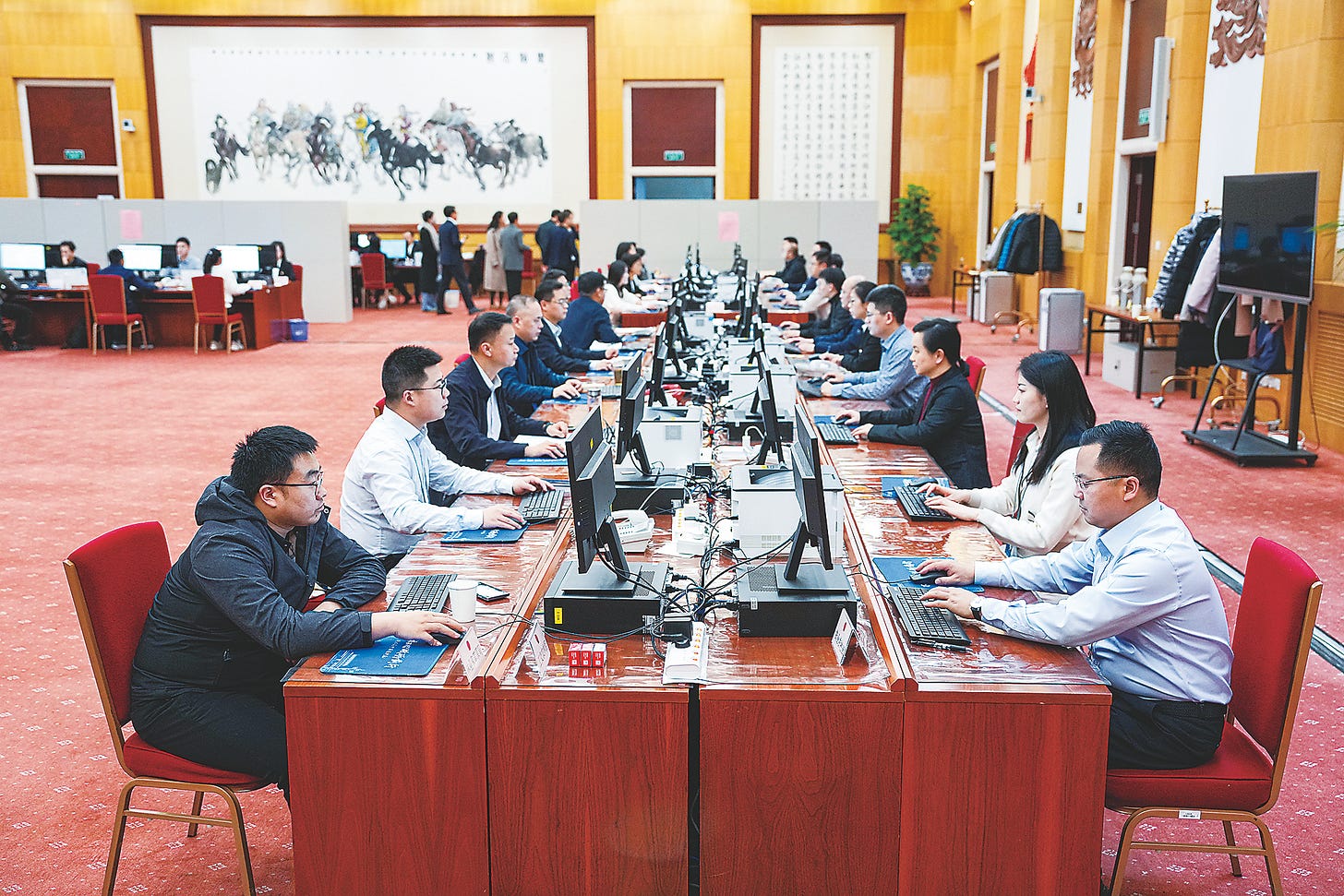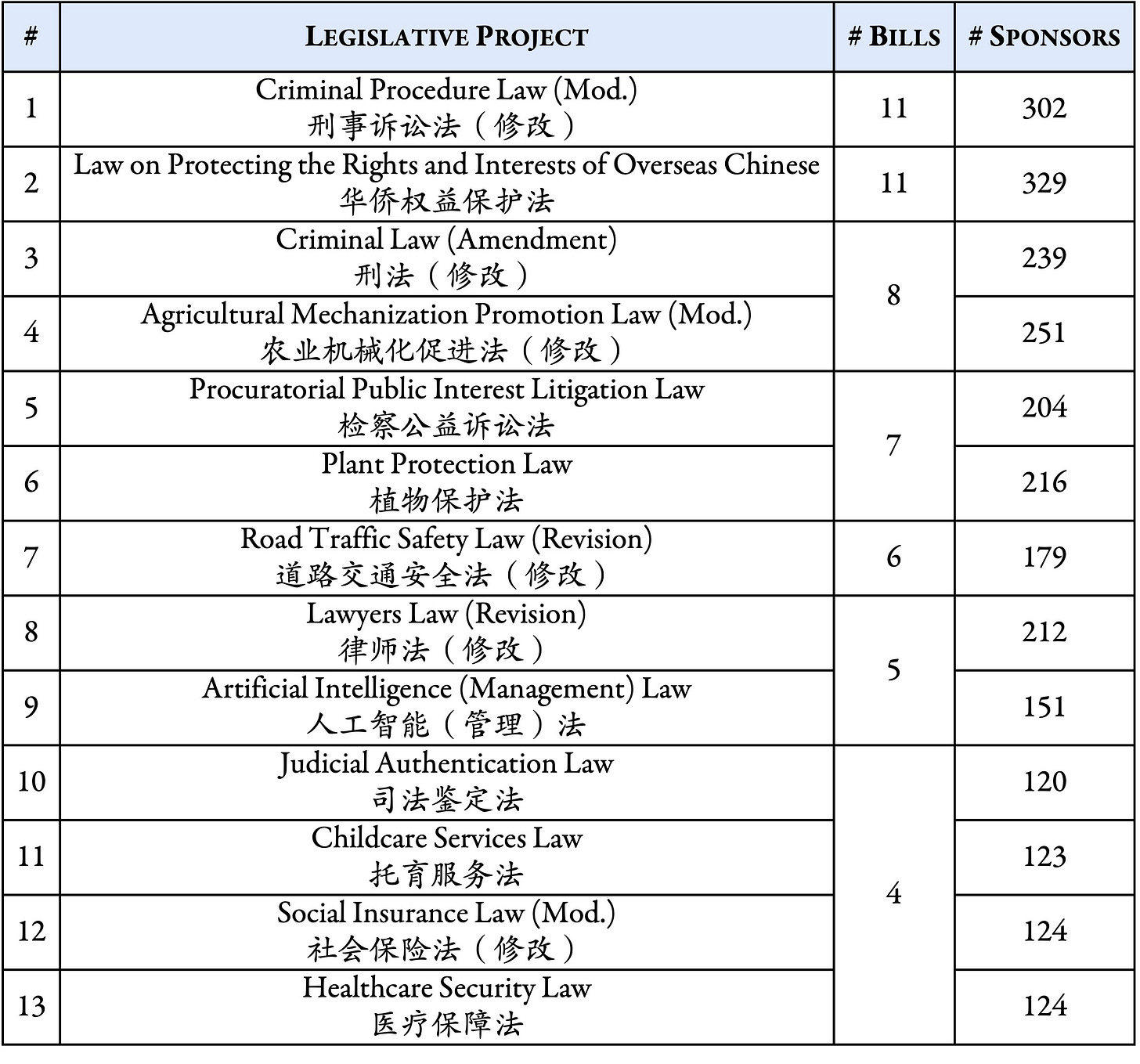May 2025: The Case of Dwindling NPC Delegate Bills
Also: Chinese legislature's 2025 work priorities and work plans. Plus: first look at delegates' legislative proposals this year.
Welcome back to NPC Observer Monthly, a monthly newsletter about China’s national legislature: the National People’s Congress (NPC) and its Standing Committee (NPCSC).
Each issue will start with “News of the Month,” a recap of major NPC-related events from the previous month, with links to any coverage published on our main site, NPC Observer. If, during that month, we have also written posts that aren’t tied to current events, I’ll then provide a round-up in “Non-News of the Month.” Finally, depending on the month and my schedule, I may end an issue with a discussion of an NPC-related topic that is in some way connected to the past month.
If you’re enjoying the newsletter, I hope you’ll share it widely. —Changhao
News of the Month
On May 1, the Rural Collective Economic Organizations Law [农村集体经济组织法] (adopted on June 28, 2024) and the decision of the NPC Standing Committee (NPCSC) authorizing the State Council to temporarily modify a provision of the Seed Law [种子法] in the Xinjiang Pilot Free Trade Zone (adopted on Apr. 30, 2025) took effect.
On May 20, the Private Economy Promotion Law [民营经济促进法] (adopted on April 30, 2025) took effect.
On May 14, the NPCSC released its 2025 work priorities and 2025 plans for legislative, oversight, and delegates-related work.
I’ve already covered this year’s legislative and oversight plans on the main site. Briefly:
The NPCSC scheduled 37 legislative projects for review in 2025, including 23 that would be reviewed for the first time. The main themes of this year’s legislation include business and financial regulation, grassroots governance, ideology and ethnic policy, social welfare, public health and safety, environmental and resource protection, and national security.
The NPCSC will review 36 oversight reports in 2025: 12 periodic reports mostly concerning fiscal and economic matters; 15 non-recurring reports covering topics including “new quality productive forces,” China’s climate change response and “dual carbon” goals, food safety, and gig worker rights; and a few topical research reports touching on diverse issues that won’t be made public.
I didn’t spot anything notable in the NPCSC’s 2025 work priorities except for this sentence: “We will take a coordinated approach to [统筹] revising and improving the foreign-related provisions in relevant laws.” As far as I can tell, this phrasing is new. The NPCSC’s 2025 legislative plan, however, still uses the older formulation “[w]e will pay close attention to [注重] refining the foreign-related provisions in relevant laws.” I’m not sure if the use of “统筹” signals a comprehensive review of existing foreign-related statutory provisions, though a general-purpose “legislation clean-up” [法律清理] is now underway, so it’ll be interesting to see its eventual scope.
I’ll return to the 2025 delegates-related work plan below. But to set the stage, let’s first take a quick look at the bills that NPC delegates introduced during the NPC session in March.

2025 NPC Delegate Bills: A First Look
The NPC’s plenary sessions offer its delegates a key annual window to submit “bills” [议案]. Unlike a “suggestion” [建议]—which needs only one signature and is most commonly directed at an administrative agency—a bill must be sponsored by either a delegation or a group of 30 or more delegates, and it calls on the legislature itself to take action. I’ve written about the procedure for processing delegate bills and their role in lawmaking here (or see this newsletter for a shorter version).
In early April, the NPCSC released a list of the bills introduced this year. For each bill, we now know its title, lead sponsor, and total number of sponsors. (For their contents, however, we’ll have to wait until the end of the year, when NPC special committees will report their recommended dispositions to the NPCSC.)
Some stats:
269 bills were submitted in March 2025—26 by delegations and 243 by groups of thirty or more delegates. All but one proposed legislation (the sole oversight bill proposed inspecting the enforcement of the National Flag Law [国旗法]).
Of the 268 legislative bills, 134 proposed new laws, 130 suggested amending existing laws, 1 proposed repealing an existing law, and 3 were codification bills. When grouped by the laws they propose to enact, amend, repeal, or codify, these bills resulted in 145 legislative projects. A bilingual list is available here.
The 13 projects with the highest number of relevant bills are shown in the table below. All appear in the 14th NPCSC’s five-year legislative plan except for the proposed Plant Protection Law and changes to the Agricultural Mechanization Promotion Law. Overall, more than 60% of this year’s bills concern legislative projects already in the current NPCSC’s legislative plans.

Delegate Bills: Quality over Quantity
As mentioned earlier, NPC delegates—nearly 3,000 strong—submitted a total of 269 bills this year. This was the third consecutive year with fewer than 300 bills submitted. Indeed, the drop in delegate bills since 2023 is quite striking (see chart below).1
As the chart illustrates, each NPC’s inaugural session typically sees the fewest bills submitted during its five-year term. The volume of bills then typically picks up the next year, though this hasn’t happened this term—a fact I noted in a previous issue of this newsletter. Now, in the current term’s third year, the number of bills not only didn’t rise but even fell below the 2023 level (albeit by just two bills).
Intrigued by this apparent new normal, I did a bit more research and found some clues in the NPCSC’s annual plans for “delegates-related work” [代表工作], which date back to 2020 and cover efforts to assist delegates in preparing bills and suggestions. In short, the NPCSC appears to have been intentionally limiting the number of delegate bills through new pre-submission quality-control mechanisms.
First, since 2020, the NPCSC has first “explored,” then “implemented,” and is now “improving” a mechanism for communication and coordination between delegates and the relevant governmental bodies before bills and suggestions are submitted. Under this mechanism, the NPCSC “coordinates” with the State Council, Supreme People’s Court, Supreme People’s Procuratorate, and the State Supervision Commission to brief delegates on their work during the past year, report on how they have adopted delegates’ proposals and improved their work, and recommend topics for future proposals. The NPCSC also facilitates delegates’ communication with the relevant government agencies to understand “current policies, work priorities, and prominent issues” and how the latter have handled delegate proposals in the past. The goal is to ensure that bills and suggestions are “more targeted and feasible.” In other words, the legislature now appears to discourage submissions that don’t align with the relevant institution’s priorities and whose proposals are therefore less likely to be adopted.
Second, in 2020, the NPCSC also began efforts to help delegates ensure that their submissions “meet political standards and quality standards” [把好政治关、质量关]—and now “legal standards” [法律关] as well. Since 2023, it appears that the 35 delegations to the NPC have also played a (bigger) role in vetting delegates’ submissions, responsible for “front-end coordination” [前端统筹] and guidance. I take this to mean that at least some submissions deemed politically inappropriate or of lower quality (e.g., because they don’t align with agency priorities or are duplicative) are filtered out early. Pre-submission vetting by delegations isn’t new, but has likely intensified in recent years.
The 2025 delegates-related work plan reiterated these measures and made it explicit that the NPCSC would “place greater emphasis on the quality of bills and suggestions, rather than their quantity.” Consistent with this approach, a legislative official claimed in both 2024 and 2025 that “the quality of this year’s delegate bills has significantly improved.”
The above tentatively explains the decline in delegate bills, but another puzzle remains. As you may have noticed, the work plans always speak of bills and suggestions together, but the volume of suggestions hasn’t declined in tandem and has in fact been trending upward for several terms (see chart below).2 So, despite the work plans’ language, the new vetting mechanisms have affected bills more heavily than suggestions. I surmise that the lower signature threshold for suggestions is a major contributing factor: since delegates don’t seek cosponsors for the vast majority of suggestions, these submissions are likely more difficult to monitor and control.
That’s all for this month’s issue. Thanks for reading!
For a preview of the NPCSC’s session this month, check out this post. An official announcement is expected next week.
This decline is also statistically significant, according to ChatGPT. The number of NPC delegates has stayed consistent over the years, between 2,920 and 2,990, and was factored into the statistical analyses. (I regret not taking any statistics course in college beyond introductory genetics.)
ChatGPT told me the upward trend since 2008 is statistically significant, but there hasn’t been a further statistically significant jump since 2023.

